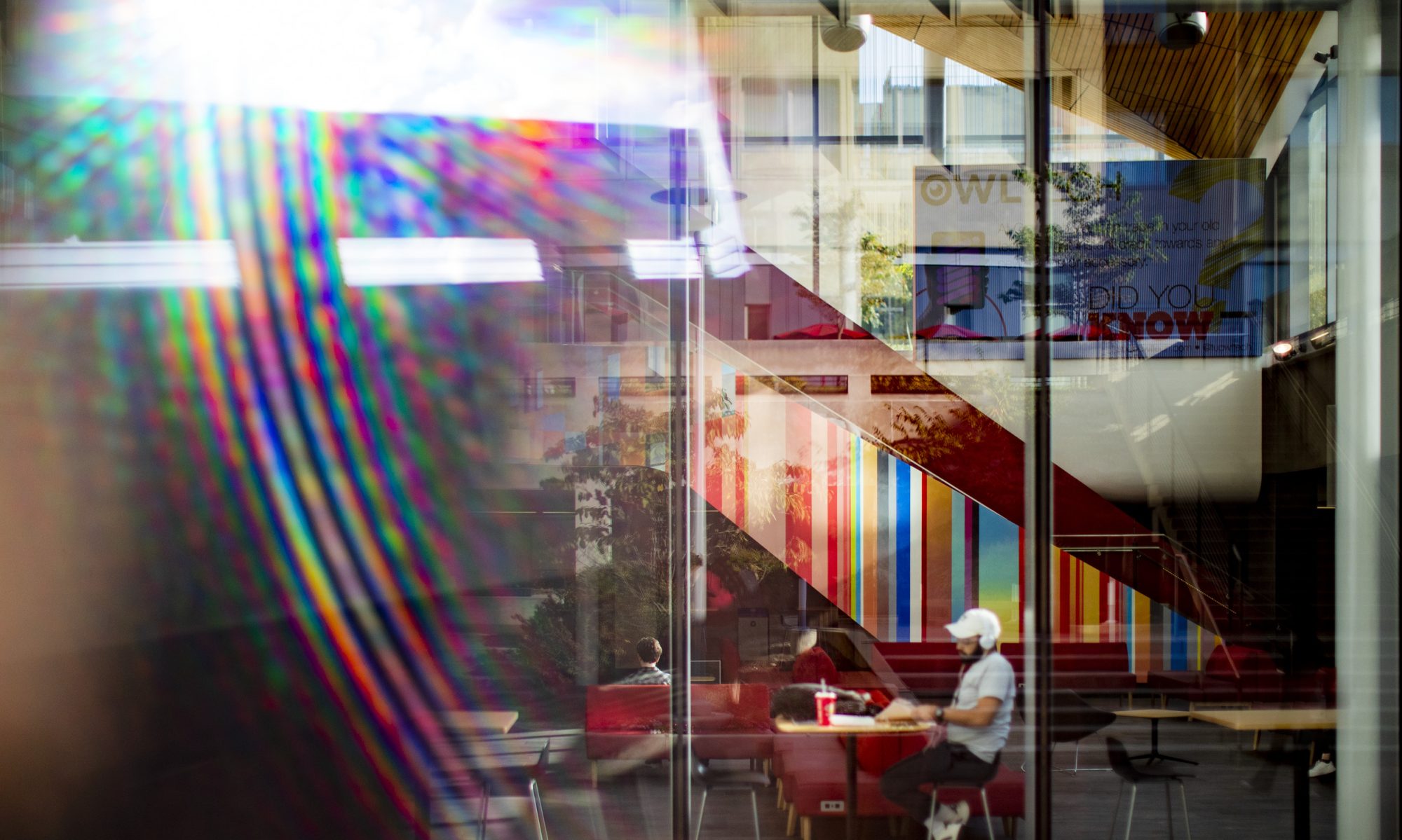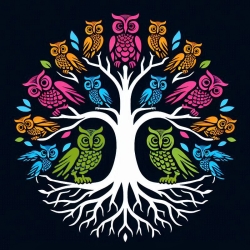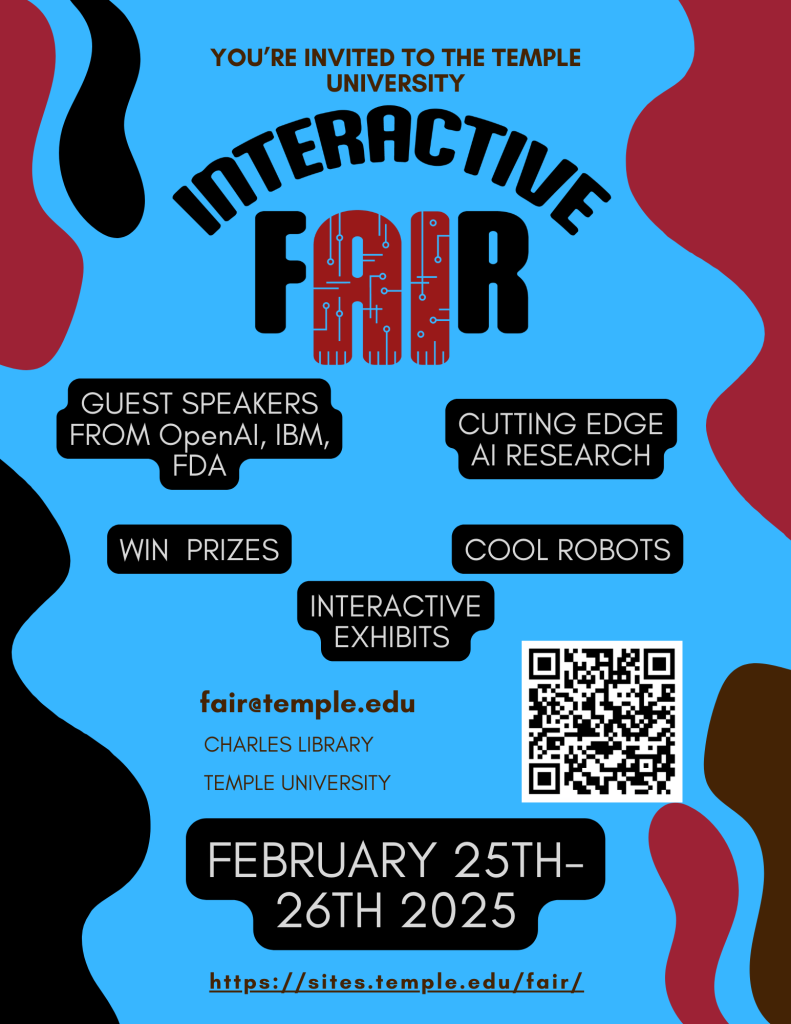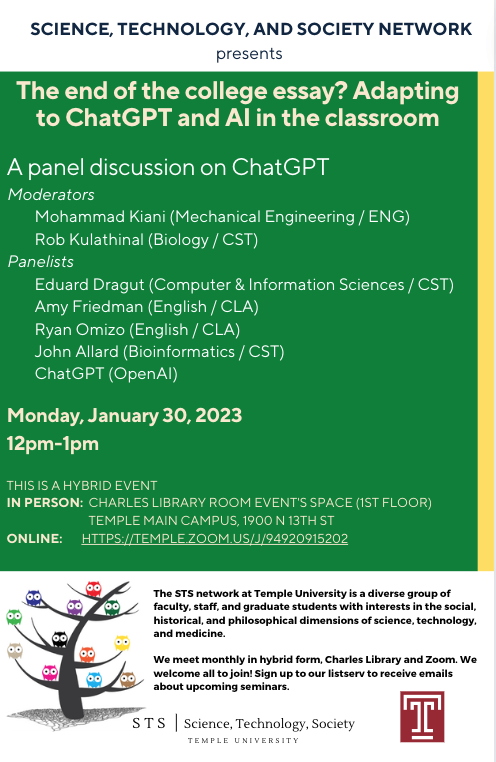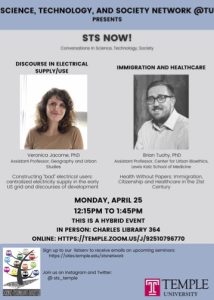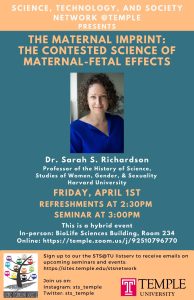Meet, Greet, Present, Plan
∼ Spring 2025 ∼
Monday, April 14
Solving the Racial Health Disparities Problem
with Quayshawn Spencer (UPenn)
Charles Library 1st Floor, and on Zoom
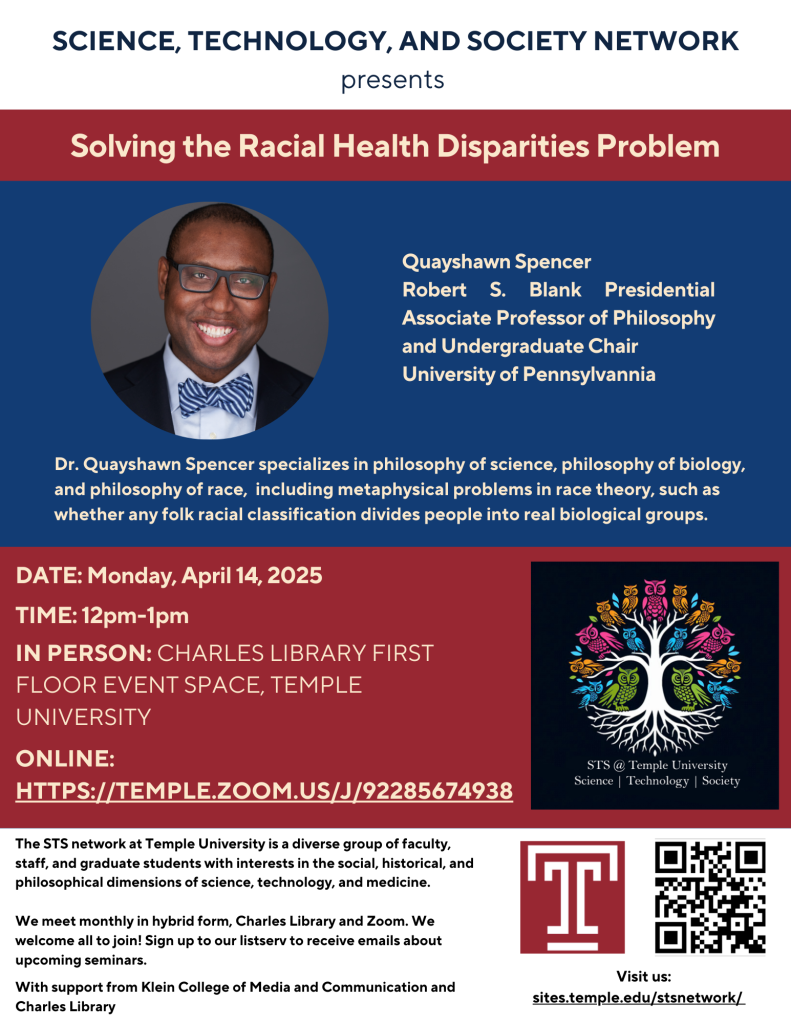
Monday, March 24
Sexual Configuration Theory
with Sari Van Anders, PhD
‘zine link below…
co-sponsored with Gender, Sexuality, and Women’s Studies
Charles Library 1st Floor, and on Zoom
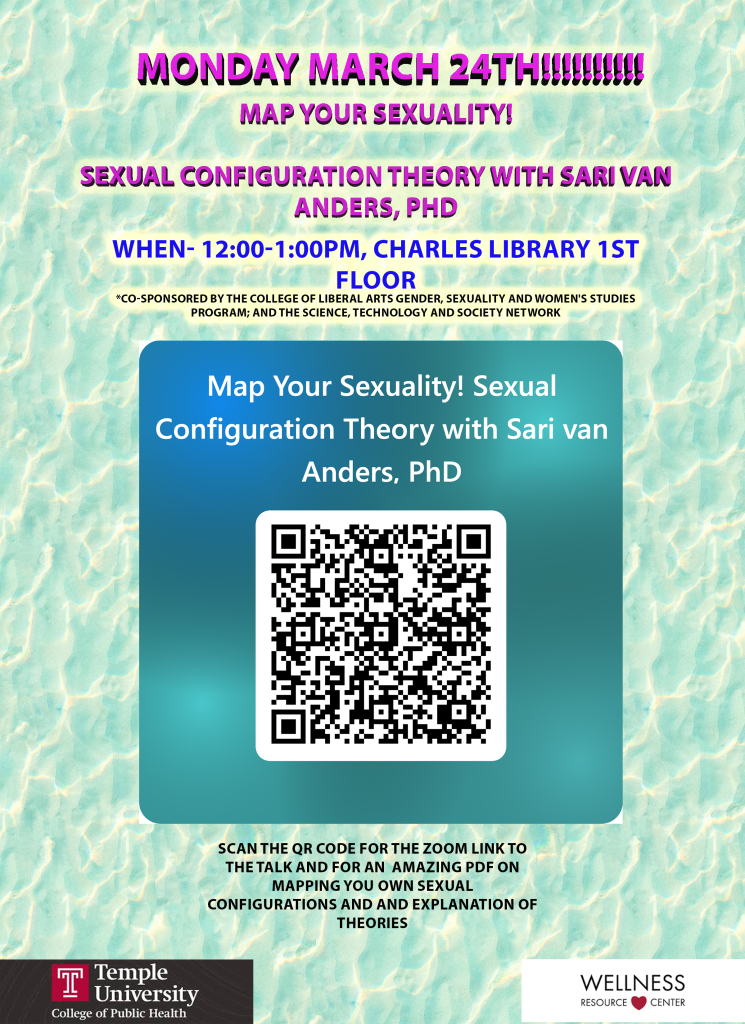
A ‘zine by Dr. Anders can be found here
And if you’re into ‘zines, don’t forget the Philly Zine Fest at Temple, Nov. 8, 2025
Bridging Disciplines: Integrating Bioengineering and Environmental Health to Tackle Microplastic Contamination
WITH
Dr. Inkyu Han (College of Public Health)
Nancy Pleshko (College of Engineering)
Monday, March 10
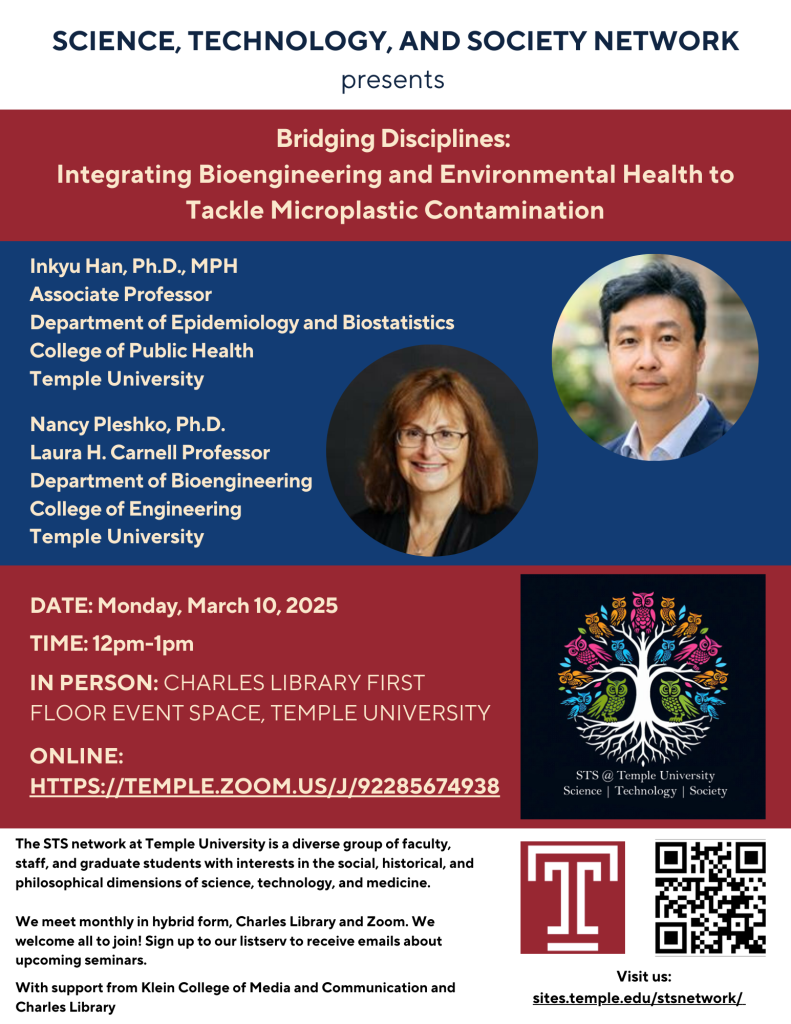
Co-Sponsored Event
February 25-26, in person
TU Interactive AI Faire
Co-Sponsored with The Department of Philosophy
Social Reproduction and the Politics of Care, by Dr. Sally Halanger
Friday, February 21st 3-5pm
Mazur 821
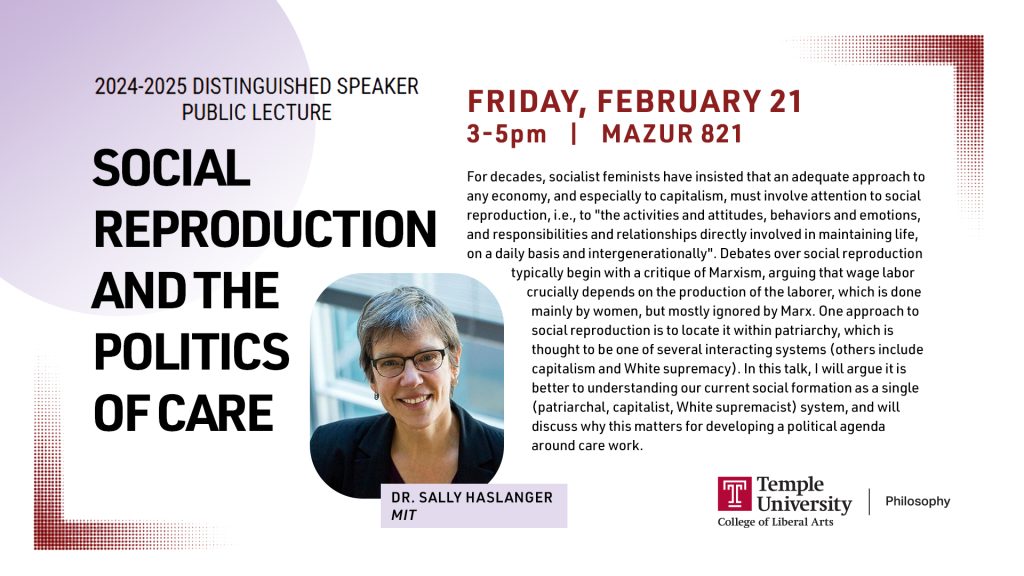
Monday, January 27, 2025
Counted Out: A Film Screening
Co-Sponsored with Temple University Libraries
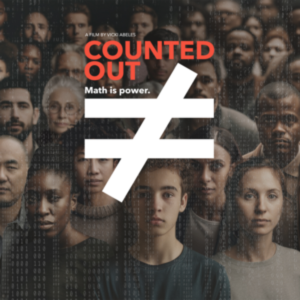
∼ Fall 2024 ∼
Monday, December 9, 2024
Charles Library and on Zoom
STS Now!
A Panel Discussion on
Museum-Academic Partnerships
Susan Glassman – Wagner Institute
Jayatri Das – Franklin Institute
Sara Ray – Science History Institute
Marina McDougall – Academy of Natural Sciences
Moderated by:
Bryant Simon – Professor of History and Academic Chair of Honors
Evangelia Bellas – Associate Professor of Bioengineering
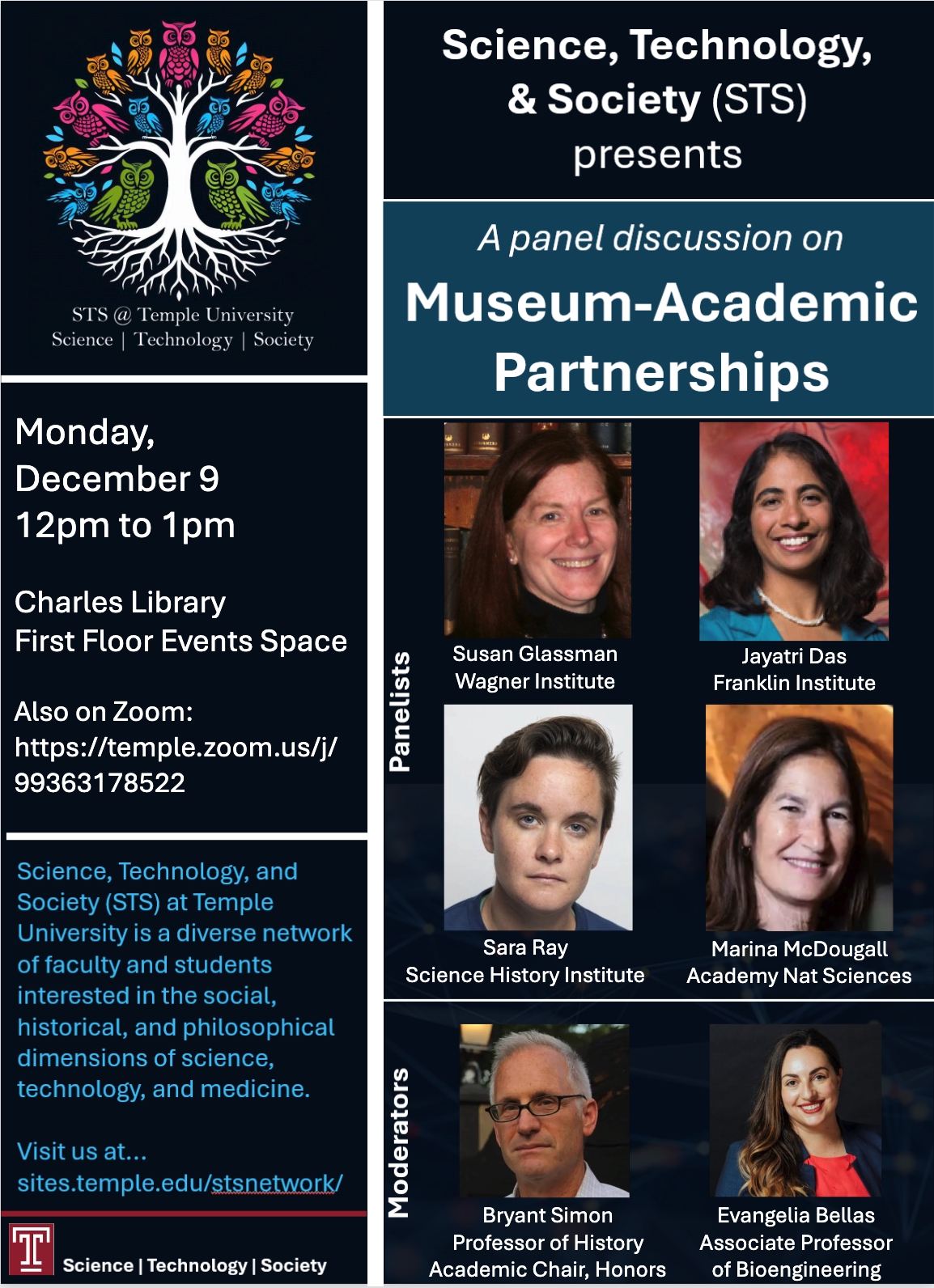
Monday, November 11, 2024
Charles Library and on Zoom
STS Now!
Understanding Wikidata’s Worldview through Semantic Network Analysis
Dr. Andrew Iliadis – Media Studies and Production, Klein
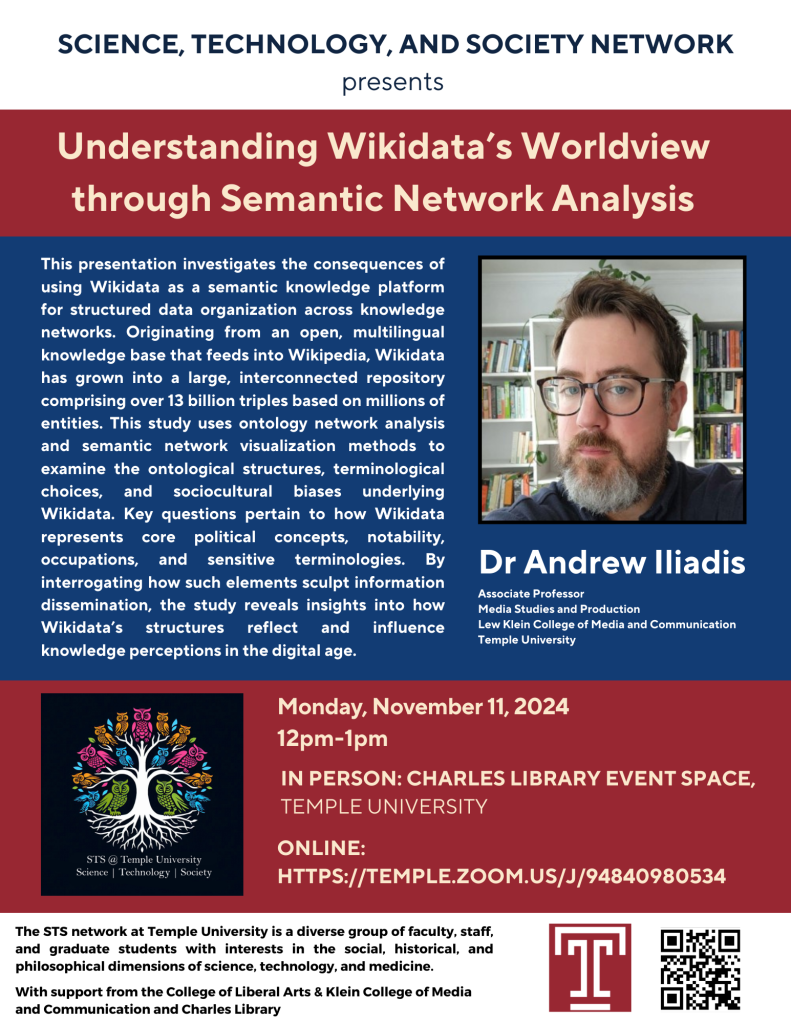
Monday, October 14, 2024
Charles Library Room 401 and on Zoom
STS Now!
Graduate Student Research Symposium
Madeline Behee – Urban Bioethics
Mitigating bias in AI/ML-enabled medical devices through stricter FDA regulation
Venitha Bernard – Bioinformatics
Investigating antimalarial drug resistance in Plasmodium falciparum using an intra-host pharmacokinetics-pharmacodynamics mathematical model.
Kevin Doherty – Philosophy/Urban Bioethics
Deflating CBT: From Orientation to Strategic Choice
Jing Han – Media and Communication
A Brief Survey of Computational Methods in Communication and Media Research
Shirin Hussain – Neuromotor Science
The Early Detection of Diabetic Peripheral Neuropathy: The Development and Validation of a Novel Smartphone Application
Cole Hagan – Neuromotor Science
Markerless Motion Capture Embedded into Telehealth Solutions
Tyler Mun – Geography, Environment and Urban Studies
The Antinomies of Measuring Neighborhood Value in Public Health
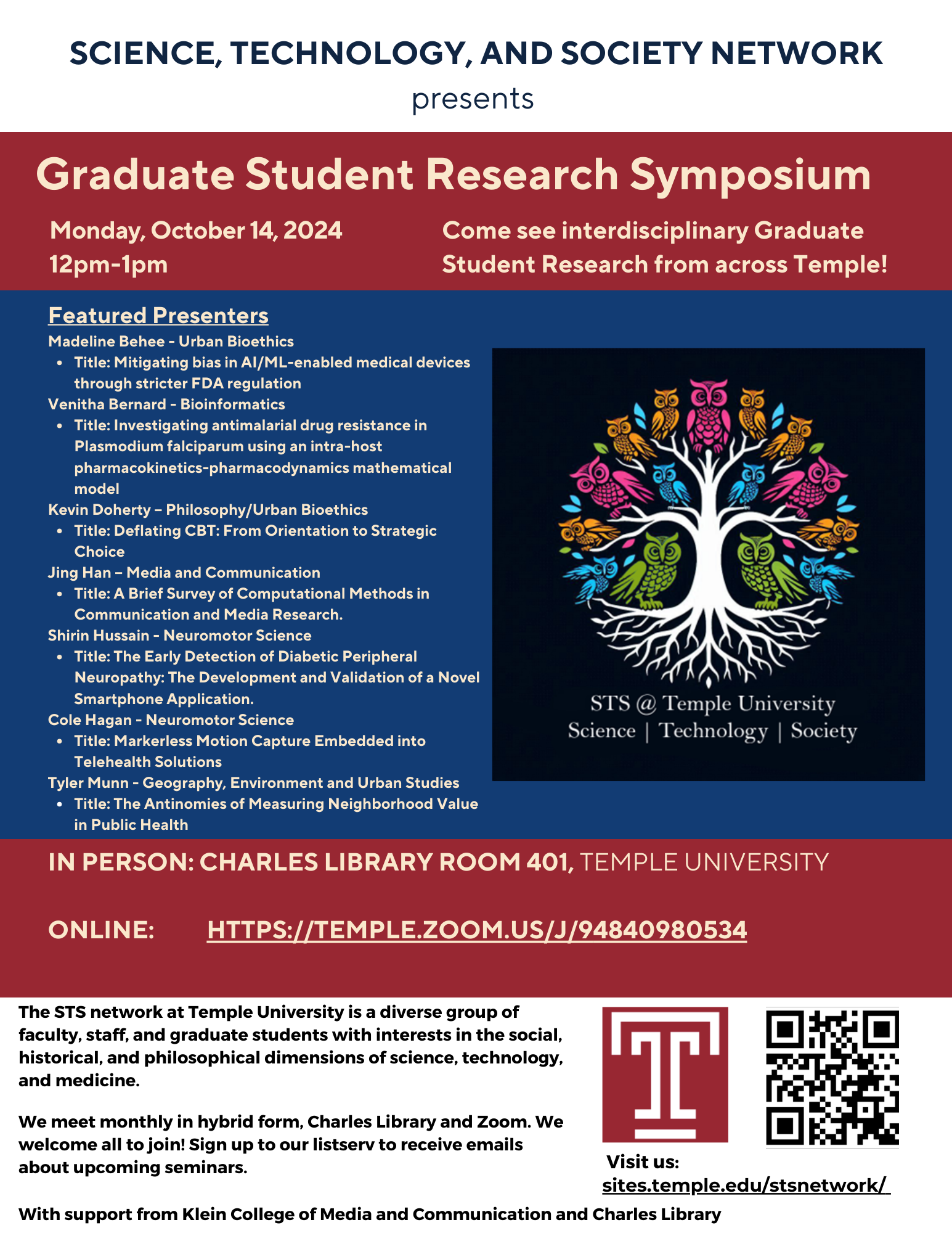
Monday, September 9, 2024
Charles Library Room 401 and on Zoom
A discussion: What is STS?
Featuring:
Miriam Solomon (Philosophy), Jim Napolitano (Physics)
Meghnaa Tallapragada (Advertising and Public Relations), Tom Waidzunas (Sociology)
Moderated by:
Joe Lucia, Dean of Libraries Rob Kulathinal, Biology
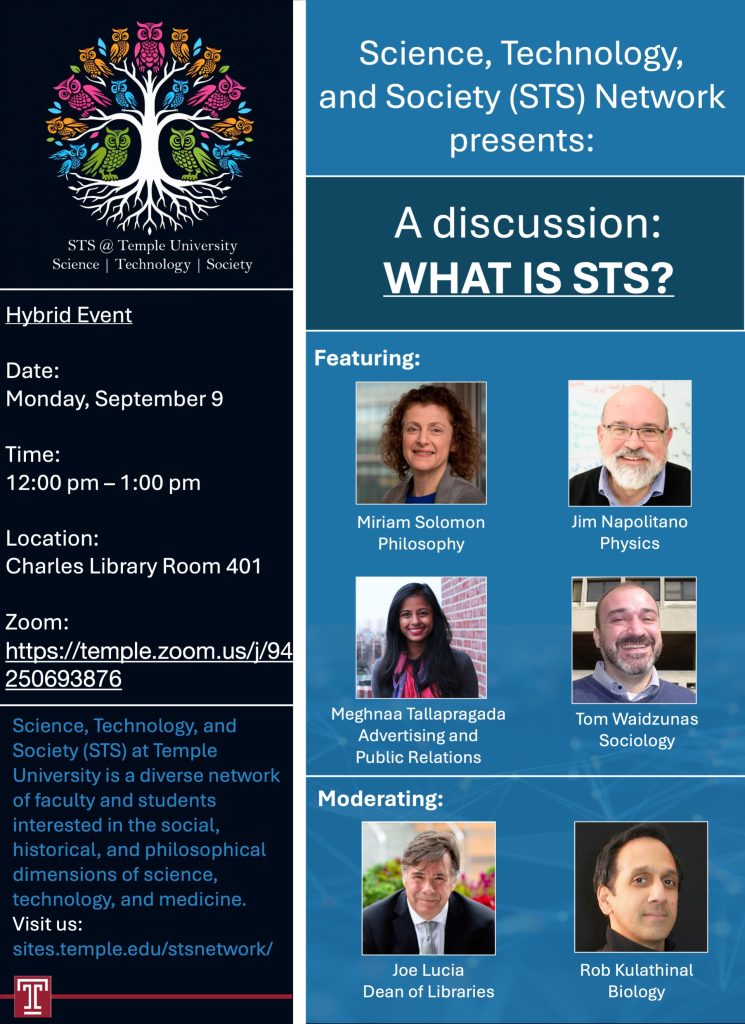
∼ Spring 2024 ∼
Monday, April 8, 2024 @ 5pm
Charles Library Event Space (please register using the QR code below)
Presented by the Charles Library and co-sponsored by the STS Network @ Temple
Dr. Nadeer Jeevanjee
“The Landscape of Climate Science”
Climate change is described in some quarters as a “crisis” and in others as a “hoax”, with a range of views in between. How can one square this with climate science, which should be more objective? This talk, led by Nadir Jeevanjee, will emphasize that there is a spectrum of climate science, ranging from well-established, “settled” science (such as global warming due to anthropogenic CO2) to highly uncertain frontier topics (such as various proposed “tipping points”). To properly interpret climate science, one must acknowledge the existence of this spectrum, and appropriately place climate and weather phenomena within it.
Jeevanjee studies the physics of clouds, radiation, and climate, using a hierarchy of approaches ranging from pencil-and-paper theory to comprehensive computer simulations. He currently is a Research Physical Scientist at NOAA’s Geophysical Fluid Dynamics Laboratory. This event will be co-sponsored by the Science, Technology, and Society network at Temple University.
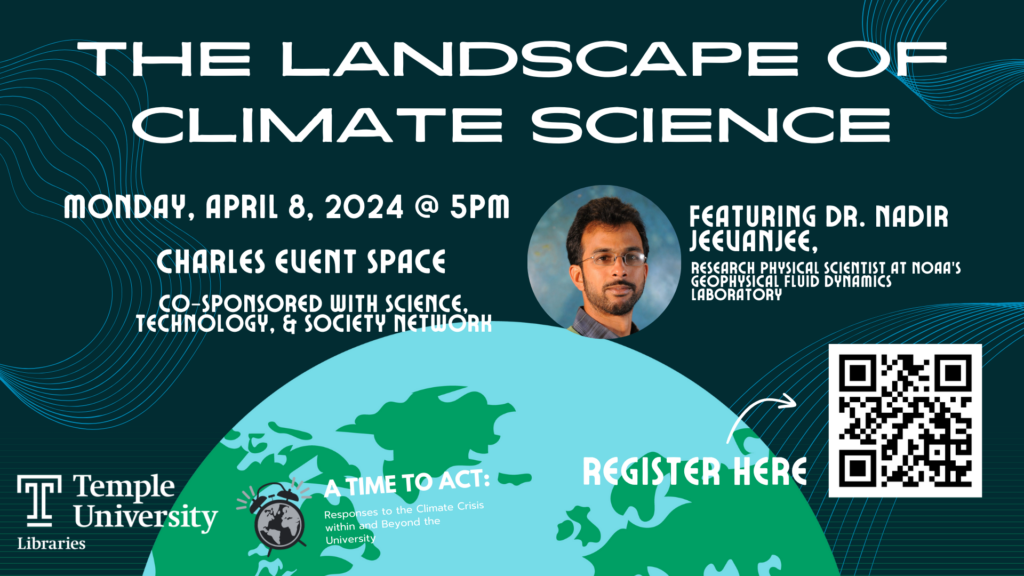
Monday, March 11, 2024: 12-1pm
Charles Library Event Space (1st floor), and via Zoom
- Mohammad F. Kiani, Professor of Mechanical Engineering
- Rob Kuper, Associate Professor of Landscape Architecture
- Amy Sinden, I. Herman Stern Professor of Law
“Climate in Curricula: Teaching for the future of work and the world”
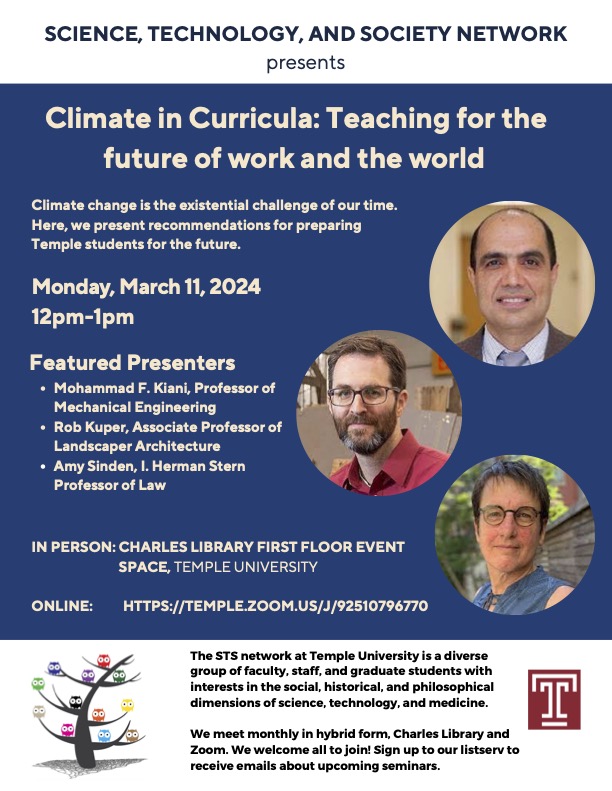
Monday, February 12, 2024: 12-1pm
Charles Library Room 401, and via Zoom
Karl Morris, Associate Professor of Instruction Department of Computer and Information Sciences
“Artificial Intelligence in Autonomous Driving: Is your Tesla Christine or KITT?”
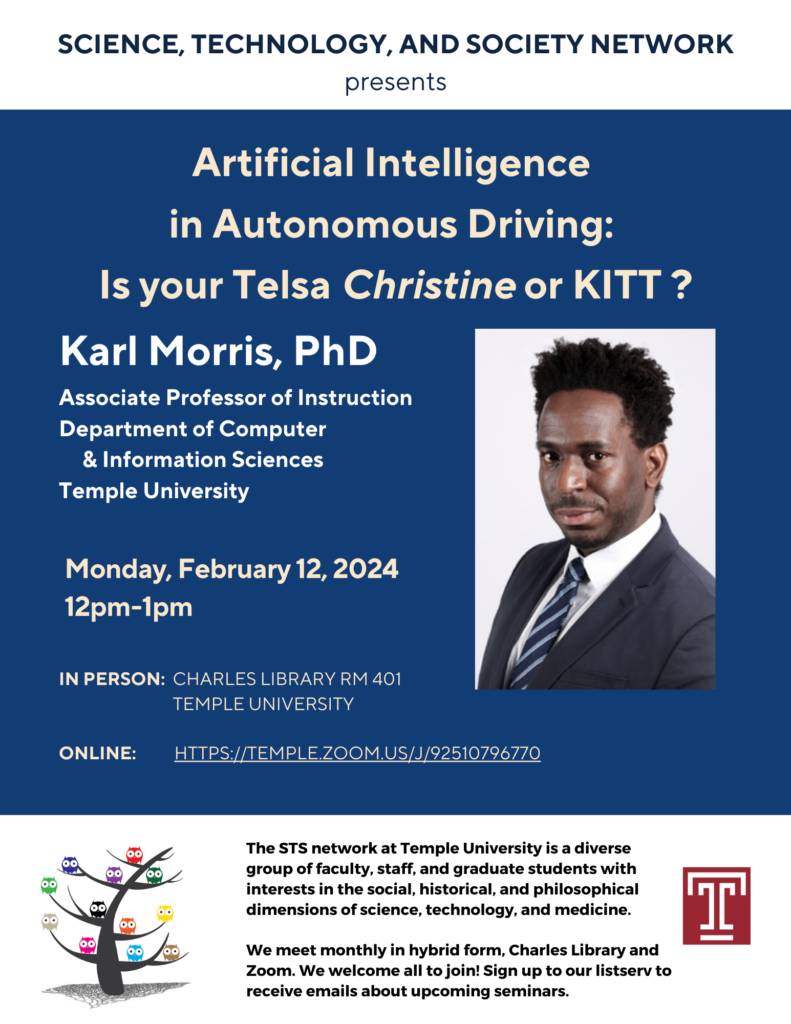
Monday, January 22, 2024: 12-1pm
Charles Library, and via Zoom
Richard Souvenir, Professor in Computer and Information Sciences and Vice Provost for Strategic Initiatives
“New Initiatives in Interdisciplinary Education & Research at Temple University”
The power of a comprehensive research university lies in the vast array of educational offerings at all levels. The sheer size of such an institution, however, presents logistical roadblocks to interdisciplinary collaboration across different Colleges. This includes both undergraduate degree offerings and graduate research opportunities. In Spring 2023, the Provost charged a group of faculty with finding ways to lower these logistical barriers and fostering interdisciplinary education and enhancing interdisciplinary research. This “Interdisciplinary Collaboration Committee” recently completed its work and submitted a detailed report to the Provost.

∼ Fall 2023 ∼
Monday, December 11, 12-1pm
Charles Library Room 401, and via Zoom
Planning and Strategy meeting open to all members of the STS Network
Monday, November 13, 12-1pm
Charles Library, Room 401, or via Zoom
Peter Simonsson (Lewis Katz School of Medicine)
“Cure Violence Philadelphia: Implementing and Studying Gun Violence Prevention Program at Temple University’s Medical School”
Gun violence is a significant social and medical concern in Philadelphia. As a response, the city develops and funds a variety of interventions to prevent violent injuries caused by gun violence. Lately, more interest and investment has been funneled towards the use of public-health models to prevent gun-violence. Public health programs often use so-called “credible messengers” or “experts by experience” to identify and engage individuals who are at-risk for either gun-related injuries or violent perpetration. Temple University hosts the Cure Violence (CV) program, which is a public-health model to reduce gun violence. CV relies on credible messengers who operate independently of law enforcement and can more easily gain trust in marginalized inner-city communities impacted by violence. Once CV has gained trust, they will identify at-risk individuals and engage them in mentoring to motivate them to leave the streets. Research exploring how CV mentoring can support desistance from gun-violence is scarce. This presentation will focus on: introducing the CV public-health approach to reduce gun violence, discuss the research evidence for it’s effectiveness, and introduce the audience to two ongoing and funded CV research projects in North Philadelphia.
and
Olivia Duffield (Lewis Katz School of Medicine)
“Getting Well: Opioid Agonist Therapy as Harm Reduction”
Hospitals are critical safety nets that engage patients with opioid use disorder (OUD) in both medical care and recovery from addiction. However, research shows that patients with OUD intentionally delay seeking care, have high rates of self-directed hospital discharge, and frequently require readmission for unaddressed medical problems. This is due, in part, to untreated pain and withdrawal. Standard of care management for withdrawal includes methadone or buprenorphine, but many patients see these options as insufficient or unrealistic due to significantly elevated opioid tolerance from a street supply dominated by highly potent, synthetic opioids such as fentanyl. Using themes derived from qualitative interviews with patients at Temple Hospital with OUD, we make the argument that it is an ethical imperative for hospitals to expand protocols to include long and short-acting opioid agonist medications to treat opioid withdrawal.
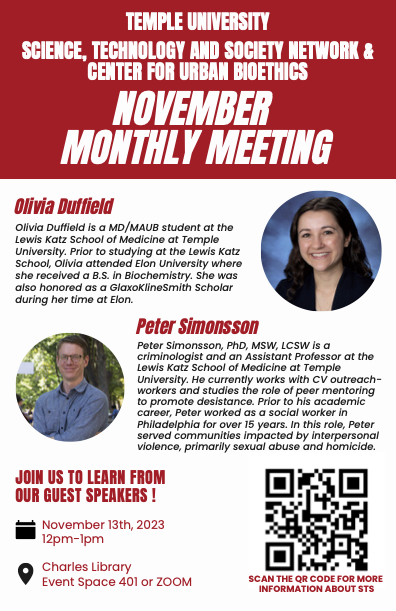
Monday, October 9, 12-1pm
Charles Library, First Floor Event Space, or via Zoom
Presenting: A Graduate Student Forum
Daniel Remer (Philosophy)
“Ethical Considerations in Expanding Available Donor Hearts through Normothermic Regional Perfusion”
Traditional approaches to organ donation have limited the recovery of hearts to only brain dead donors. Recent technology known as normothermic regional perfusion (NRP) has allowed for available donor hearts to expand to non-brain dead deceased donors (i.e., cardiac dead donors). However, because NRP involves restoring a flow of oxygenated blood to the body, as well as a heartbeat, there are ethical considerations to be addressed, among which includes whether such donors really are dead. While NRP can help expand available donor hearts for transplant, the ethical implications must first be considered to prevent moral and actual harm and to ensure continued public trust in the organ donation process.
and
Gabriel Reagan (Geography and Urban Studies)
“The Digital (De)Construction of Food: Encountering taste, pleasure, and satiation in a reapidly interconnected world”
Consuming food media today requires interacting with an endless array of actors—varying in intentions and expertise—each with the potential to impact media users’ health and well-being in positive or adverse ways. At the same time, the growing dissonance between science and facts, influencers, and the public sphere is fostering incessant confusion and contradiction. Intensifying parasocial relationships, or nonreciprocal socio-emotional connections with individuals such as influencers, are rapidly transforming the ways in which we come to understand food and bodies. As media influencers and corporate-sponsored, algorithmically powered content creators exploit the affective power of food for personal gain, locating answers to food-related conundrums now requires traversing a vast information landfill where opinions are plentiful, but legitimacy remains murky.
My current research aims to unpack the affective ways in which we come to know food through the consumption of social media. I envision media as another somebody in the room, provoking an exchange between creator and consumer, an exchange that ‘does something’. If influence now has the power to supplant science, how do we know what information to take in and which to ignore? Timely and relevant, this paper tackles the increasingly common ways in which we come to know food digitally and further asks who is a creator, who is a consumer, and what is the relationship between them. What are the moral and ethical implications and who stands to gain, or lose, in the social construction of food?
THURSDAY, September 21, 12-1:30pm
Mazur Hall 140 (Center for Anti-Racism)
Please register here: https://forms.office.com/r/25camCb8Fv by Monday, Sept. 18
Dr. Ira Lawrence (Temple alum)
“Ethical Dilemmas in the Pharmaceutical Industry: an Insider’s Perspective”
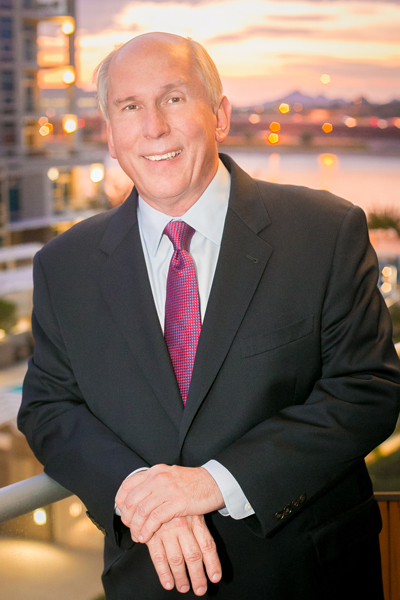
Jointly sponsored by the Science, Technology, and Society Network, the Philosophy Department, and the College of Liberal Arts
∼ Spring 2023 ∼
Monday, May 8, 12-1pm
Charles Library Even Space (1st floor, 1900 N 13th St) and online: https://temple.zoom.us/j/92616703278
Making Families, Choosing Race: Sperm Banks and the Limits of Diversity
with Alyssa M. Newman, PhD, Georgetown University
The widespread use of assisted reproductive technologies, coupled with demographic and social change, are normalizing new family configurations that extend beyond biological kinship. Despite the new populations and family formations utilizing these technologies, sperm donor selection is dominated by heteronormative logics and an interest in family resemblance achieved through racial matching. Yet the achievement of racial matching is hardly a given, as 70% of the sperm donors at banks across the United States are white. This talk will interrogate the racialized meanings assigned to donor sperm, drawing on interviews with interracial lesbian couples who encountered difficulties finding a donor of their desired racial background. This talk will also explore the sperm banks’ “diversity problem,” examining how, despite the fertility industry’s quick embrace of diversifying family formations including queer clients and intended parents of color, it continues to center around the reproduction of the white family. In a context of increasing state control over reproduction, the rise of both regulated as well as unregulated sperm markets raises the question of who is being served, or controlled, in the presence or absence of state intervention and policy.
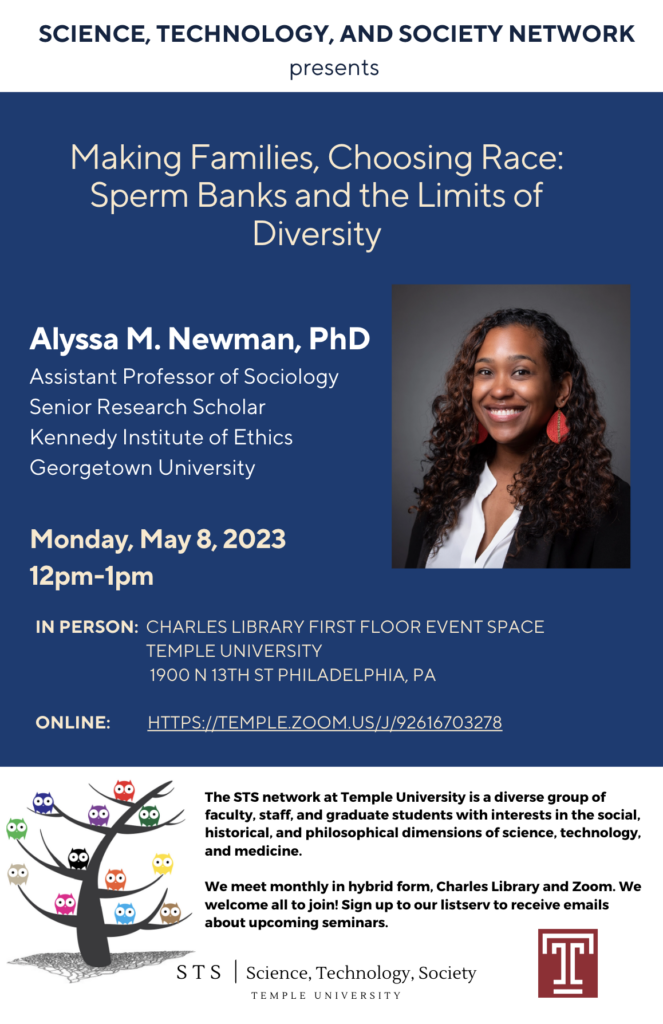
Monday, March 13, 12-1pm
STS NOW! – CONVERSATIONS IN SCIENCE, TECHNOLOGY, SOCIETY
Charles Library Even Space (1st floor, 1900 N 13th St) and online: https://temple.zoom.us/j/94441410987
The Industrialization of the Deep Ocean: Can we avoid the Tragedy of the Commons on the High Seas?
with Prof. Erik Cordes, Department of Biology
As we struggle to move beyond fossil fuels and avoid the most catastrophic outcomes of global climate change scenarios, we are increasingly turning to the ocean and the emerging Blue Economy for solutions. Our fisheries are moving into deeper waters further offshore, we are drilling for oil and gas in places that were thought impossible a few years ago, and emerging industries like deep-sea mining and marine genetic resources are looking to international waters as a way to avoid the regulations and expense of working with the exclusive economic zones of nation-states. Currently, there are negotiations underway at the UN to govern these activities, which range from the designation of the management entity to the methodology for determining environmental impacts. Among these consideration is the proper valuation of ecosystem services and the creation of a global fund that would contain the dividends from the extraction of natural resources. Because these considerations are happening at a global scale, beyond areas of national jurisdiction, we have an opportunity to consider some new(ish) ideas related to ownership, nature’s rights, and a global universal income. Time will tell whether any of these creative ideas gain traction in this forum.
Monday, February 13, 12-1pm
STS NOW! – CONVERSATIONS IN SCIENCE, TECHNOLOGY, SOCIETY
Charles Library Even Space (1st floor, 1900 N 13th St) and online: https://temple.zoom.us/j/92510796770
A discussion of the partisanization of science.
Prof. Bruce Hardy
(Dept. of Communication and Social Influence, Klein College of Media and Communication)
There exists a narrative in the United States that Democrats are pro-science and Republicans are anti-science. This narrative was exacerbated by the Covid-19 pandemic. Such partisanization of science is detrimental to the norms of science, the scientific enterprise, the legitimacy of scientists and experts, and may foster public perceptions that science is owned by a political party. Partisanization of science breeds misinformation and reinforces ingroup/outgroup divisions. Bruce Hardy will discuss how we got here, what science communication and STS scholars can do about it, and what to expect in the future.
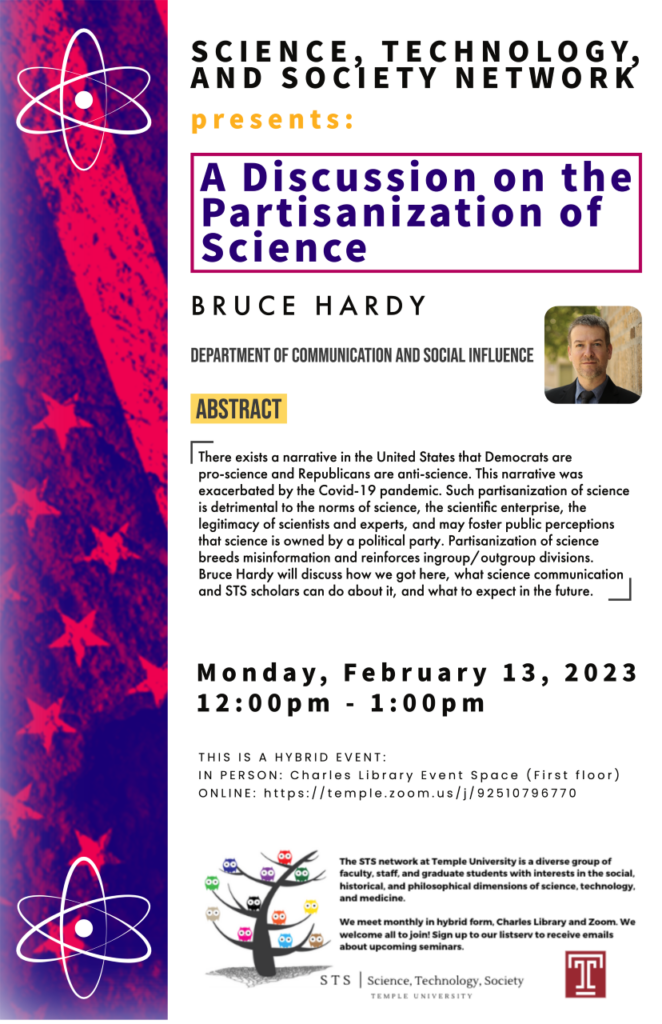
Monday, January 30, 12-1pm
Charles Library Even Space (1900 N 13th St) and online: https://temple.zoom.us/j/94920915202
The end of the college essay?
Adapting to ChatGPT and AI in the classroom.
Panelists:
Dr. Eduard Dragut (Computer & Information Sciences)
Dr. Amy L. Friedman (English, First Year Writing)
Dr. Ryan Omizo (English)
John Allard (PhD student, Bioinformatics)
ChatGPT (OpenAI)
Moderated by:
Dr. Mohammad F. Kiani (Mechanical Engineering)
Dr. Rob J. Kulathinal (Biology)
∼ Fall 2022 ∼
Monday, December 12, 12-1pm
Charles Library Room 364 (1900 N 13th St) and online: https://temple.zoom.us/j/98315483581
Discussion with Asta Zelenkauskaitė, author of:
“Creating Chaos Online: Disinformation and Subverted Post-Publics”
With the prevalence of disinformation geared to instill doubt rather than clarity, Creating Chaos Online unmasks disinformation when it attempts to pass as deliberation in the public sphere and distorts the democratic processes. Asta Zelenkauskaitė finds that repeated tropes justifying Russian trolling were found to circulate across not only all analyzed media platforms’ comments but also across two analyzed sociopolitical contexts suggesting the orchestrated efforts behind messaging. Through a dystopian vision of publics that are expected to navigate in the sea of uncertain both authentic and orchestrated content, pushed by human and nonhuman actors, Creating Chaos Online offers a concept of post-publics. The idea of post-publics is reflected within the continuum of treatment of public, counter public, and anti-public. This book argues that affect-instilled arguments used in public deliberation in times of uncertainty, along with whataboutism constitute a playbook for chaos online.
Monday, November 14, 12-1pm
Charles library First Floor Event Space or online
STS NOW! – Conversations in Science, Technology, Society
Andrew Spence (Engineering)
Neuromachanics, Neurogenetics, and Spinal Cord Injury:
Uncovering the mechanisms of movement and how they may help us improve recovery from a paralyzing injury.
Movement is key to health and quality of life. Yet our understanding of the principles we use to control our bodies and the clever mechanisms that have evolved to get us around are far from complete. Furthermore, hundreds of thousands of people in the US alone are living with spinal cord injuries, reducing their quality of life, with few treatments available. This talk will present work seeking to understand how we control our movement, asking why legged locomotion tends to look like bouncing over a pogo stick. It will then move into more recent work that seeks to understand how forms of spinal cord stimulation help improve recovery from a spinal cord injury, employing new genetic tools that allow for ever more sophisticated manipulation and tracing of neural networks.
Monday, October 10, 12-1pm
Charles library First Floor Event Space or https://temple.zoom.us/j/92510796770
STS NOW! – Conversations in Science, Technology, Society
Todd Schifeling (Fox)
Divest, Delay, or Distract: Managing Conflicting Stakeholders amid Industry Disruption
While managers prefer to integrate the interests of multiple stakeholders, these groups often have conflicting goals. Industry disruptions intensify these conflicts, with some stakeholders favoring the status quo and others encouraging change. We investigate how managers balance conflicting stakeholders under such duress. Using the context of the U.S. electricity industry from 2008-2015, we find that inertial and activist stakeholders influence the divestment of coal generators in opposite directions. Further, by disentangling divestment announcements from implementation and considering the additional outcome of solar investments, we show how managers use strategic delay and distraction to mollify activists, while also benefitting inertial stakeholders.
Andrew Spence (Bioengineering)
~
Monday, December 12, 12-1pm
TBA
Monday, September 12, 12-1pm
STS NOW! – Conversations in Science, Technology, Society
Brian Hutler (Philosophy) – Health Disparities and Indirect Discrimination: Two Puzzles, One Solution
Hybrid Event: Charles Library 364 and https://temple.zoom.us/j/92510796770
Health disparities, especially racial and ethnic health disparities, are often unjust. But what makes these health disparities unjust? Theorists typically explain this injustice by pointing to some other injustice that either causes, or is caused by, the health disparities. But I will argue that these “causal” accounts of the injustice are incomplete and that we should look for an alternative account. Similarly, theorists struggle to explain the apparent “wrongness” of indirect discrimination in healthcare, e.g., when a hospital’s policies negatively impact protected groups but are not motivated by racism or other forms of animus. In this talk, I will argue that both of these theoretical puzzles admit of a single solution: Both the injustice of health disparities and the wrongness of indirect discrimination in healthcare can be explained by appeal to the right to health. According to the conception of the right to health that I will propose, both reflect failures on the part of relevant duty-bearers to fulfill the obligations they have to relevant rights-holders. I will argue, in conclusion, that the ability to resolve this pair of theoretical puzzles lends support to the conception of the right to health proposed here.
∼ Spring 2022 ∼
Monday, April 25, 12:15-1:45pm
STS NOW! – Conversations in Science, Technology, Society
Hybrid Event: Charles Library 364 and https://temple.zoom.us/j/92510796770
Veronica Jacome (GUS)
Constructing “Bad” Electrical Users: Centralized Electricity Supply in the Early US Grid and Discourses of Development
Brian Tuohy (Katz)
Health Without Papers: Immigration, Citizenship, and Healthcare in the 21st Century
Friday, April 1, 3:00pm (2:30 refreshments)
BioLife Sciences Building, Room 234, and online at https://temple.zoom.us/j/92510796770
The Maternal Imprint: The Contested Science of Maternal-Fetal Effects
Sarah S. Richardson (History of Science and Studies of Women, Gender, and Sexuality, Harvard)
Monday, February 21, 12:15-1:45pm
STS NOW! – Conversations in Science, Technology, Society
Erica Golemis (Fox Chase) – Capacity Building: Building a Department of Cancer Biology Linked to a Cancer Center; balancing multiple value systems while defining success
and
Lauren Olsen (Sociology) – Disciplining Docility: How Medical Educators use the Humanities to Maintain the Professional Status Quo
Monday, January 24, 12:15-1:45pm
A Discussion of Our Favorite Works by Robert K. Merton
Panelists: Tom Waidzunas (Sociology), Meghnaa Tallapragada (Advertising and Public Relations), Bruce Hardy (Communication and Social Influence), David Elesh (Sociology, Emeritus)
Merton Readings:
Merton, 1938. Science, Technology, and Society in Seventeenth Century England
Merton, 1942. The Normative Structure of Science
Lazarsfeld and Merton, 1948. Mass Communication, Popular Taste, and Organized Social Action
Merton, 1957. The Role-Set_Problems in Sociological Theory
∼ Fall 2021 ∼
Hybrid meetings:
both in Charles Library, room 364 (enter room 375, turn left, then right around the corner)… and at https://temple.zoom.us/j/92510796770
Monday, December 13, 12:15-1:45pm
Making the Invisible, Visible: Reimagining Scientific Discovery
Rebecca Kamen (Artist in residence, The Computational Neuroscience Initiative, UPenn)
STS-seminar_Dec132021_Kamen_poster
Monday, November 8, 12:15-1:45pm
Societal Impacts of Nuclear Energy: An Introduction to STS
Jim Napolitano (Physics) and Tom Waidzunas (Sociology)
Monday, October 11, 12:15-1:45pm
Working Maintenance and Repair into Science and Technology Studies
Eli Alshanetsky (Philosophy) and Juris Milestone (Anthropology)
Monday, September 13, 12:15-1:45pm
A Conversation on Kuhn’s The Structure of Scientific Revolutions
Miriam Solomon (Philosophy) and Tom Waidzunas (Sociology)
∼ Spring 2021 ∼
Monday, April 12 via Zoom
Artificial Intelligence and Machine Learning can improve all aspects of our lives… Could it also replace us?
Speakers:
Slobodan Vucetic, Center for Hybrid Intelligence, Temple University
Richard Souvenir, CIS, Temple University
Bora Ozkan, Finance, Temple University
Cory Ng, Accounting, Temple University
Moderators:
W. Geoffrey Wright, Neuromotor Sciences, Temple University
Bertand Guillotin, Strategic Management, Temple University
Friday, March 5 via Zoom
With Global Studies, Temple Libraries, CHAT, and the Loretta C. Duckworth Scholars Studio
Modeling the Mind: From Buddhism to Artificial General Intelligence
Joscha Bach, AI Foundation, San Fransisco
Marcus Bingenheimer, Religion, Temple University
Pei Wang, Computer and Informational Sciences, Temple University
Simon Wiles, Center for Interdisciplinary Digital Research, Stanford University
Monday, February 8 via Zoom
Engineering Climate Change: Building LGBTQ-inclusive classrooms and workplaces in STEM
Stephanie Farrell, College of Engineering, Rowan University
∼ Fall 2020 ∼
Monday, December 14 via Zoom
Interdisciplinarity in the RCM era: Proposing a new undergraduate degree in Science, Technology, & Society
Jim Napolitano (Physics, College of Science and Technology, Temple University)
Monday, November 9 via Zoom
A panel discussion on gene drive: On the fate of species via genetic manipulation
Panelists
Virginie Courtier-Orgogozo (Institut Jacques Monod, University of Paris)
Darius Balciunas (Biology, Temple university)
Miriam Solomon (Philosophy, Temple University)
Bruce Hardy (Communication & Social Influence, Temple University)
Moderator
Rob Kulathinal (Biology, Temple University)
Monday, September 14 via Zoom
Susan Lindee (History and Sociology of Science, University of Pennsylvania)
“Creating the Galapagos Field Station at Santa Cruz, 1950-1970”
Monday, October 12 via Zoom
Nancy Campbell (Science and Technology Studies, Rensselaer Polytechnic Institute)
Workshop: Designing an Undergraduate Major in STS
∼ Spring 2020 ∼
Wednesday, April 15
Virtual chat with the STSN@TU at the Center for Humanities
Monday, February 10
Gwen Ottinger (Center for Science, Technology and Society, Drexel University)
Charles Library
∼ Fall 2019 ∼
Monday, December 9
Justin Brody (Center for Data, Mathematical, & Computational Sciences, Goucher College) Machine Consciousness as a Pathway to Artificial General Intelligence
Charles Library
Monday, November 18
Allison Hayes-Conroy (GUS) Building a Bio3Science Research and Training Network
Monday, October 14
Juris Milestone (Anthropology) Disrupting Innovation’s Domination
Monday, September 9
Miriam Solomon (Philosophy) Evidence and Values in the DSM 5.X
Marcus Bingenheimer (Religion) and Rob Kulathinal (Biology) Sutra2DNA
∼ Spring 2019 ∼
Tuesday, April 30
Open Planning Meeting
Monday, April 15
Tom Waidzunas (Sociology) NSF LGBT Safe Zone Initiative
Monday, March 18
Aunshul Rege (Criminal Justice) – Proactive Cybersecurity & human behavior
Sue Wells (English) – Robert Burton, Medicine, & Early Modern Practices of Knowledge
Monday, February 18
Andrew Iliadis (Media Studies) – Semantic and embodied computing
Jess Newman (Anthropology) – Medical Anthropology
Monday, January 14
Planning Meeting
∼ Fall 2018 ∼
Monday, December 10th
Planning meeting
Monday, November 12th
Allison Hayes-Conroy, Carol Brandt, and Rob Kulathinal will present their ideas for a grant proposal
Miriam Solomon will present some ideas from her work on consensus in psychiatry
Monday, October 15th
Round Table on “Sokal Squared” controversy
Jim Napolitano (Physics) on bias in scientific discovery
Monday, September 17th
Steven Epstein, Northwestern University
∼ Summer 2018 ∼
Interdisciplinary Grants Meetup
Friday, June 15th
∼ Spring 2018 ∼
Monday, May 7th
Ralph Horwitz, Katz School of Medicine
“Medicine-Based Evidence”
Monday, April 16th
Marcus Bingenheimer, Religion
“Chinese Buddhist History as Network(s) – On the use of historical social network analysis in the study of Chinese Buddhism”
Rita Krueger, History
“Medical Authority in the Age of Smallpox: Knowledge Networks in Central Europe”
Monday, March 19th
Miriam Solomon, Philosophy – “Epistemic Collusion in Stem Cell Clinics”
Tom Waidzunas, Sociology – recent work on LGBT scientists
Monday, February 19th
Byron Wolfe, Photography
∼ Fall 2017 ∼
Monday, November 27th
Roderick Coover, Film and Media Arts and Guntram Werther, Fox
Monday, October 30th
Allison Hayes-Conroy, GUS, Rob Kulathinal, Biology, and Carol Brandt, Education
The Bio-Social Partnerships graduate studio promotes collaboration and transdisciplinary research training across life sciences and social sciences, using the human body as a boundary object to bridge these domains.
Monday, October 2nd
Tania Jenkins, Sociology and Tom Waidzunas, Sociology
Tania Jenkins presented work coauthored with Susan Short (Brown University) that uses intersex as a case for theorizing the role of resistance in the sociology of diagnosis.
